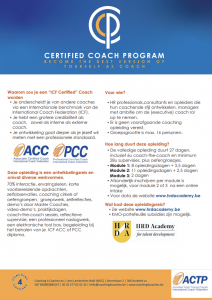- Je leert coachen aan de hand van de 8 ICF competenties. Je kan het ICF competentiemodel hier downloaden.
- Je leert coachen op gedrags- en competentie niveau en het bewerkstelligen van perceptieverruiming.
- Je wordt vaardiger in procesbegeleiding: je ondersteunt oplossingsprocessen, zelfbewustwordingsprocessen en bewuste beslissingsprocessen!
- Tijdens deze opleiding ontwikkel je je eigen coachingsstijl en leg je je persoonlijke accenten om de beste versie van jezelf als coach te worden.
- Na het volgen van de CCP – Fundamentals Module ben je in staat om te coachen op het niveau van Associated Certified Coach zoals beschreven door ICF.
In deze opleiding leer je de stevige fundamenten van het coachen.
Je kan na deze module al je ACC (Associated Certified Coach) of je “Level 1” diploma aanvragen bij ICF. (International Coach Federation) op basis van 100 uren praktijkervaring.
Indien je ook de CCP – Advanced Module én de CCP – Certification Module succesvol beëindigt, en 500 uren praktijk verzameld hebt, kan je het PCC (Professional Certified Coach) certificaat rechtsreeks bij het ICF aanvragen.
Blok 1: Coaching als rol, stijl, vaardigheid, attitude en beroep
- Wat is coaching en op welke niveaus coach je?
- Wat is coaching en wat is het niet?
- De rol van de coach en de coachende stijlen en rollen.
- De basishouding en de overtuigingen van de coach.
- De bouwstenen van een coaching gesprek.
- Kennismaken met de PCC Markers en de ICF competenties.
- Het ontwikkelingstraject van jezelf als coach en van je coachee.
- Niveaus en thema’s van coaching.
- Coaching en leerprocessen en veranderingsprocessen.
- Coaching in relatie tot andere beroepen.
Blok 2: Verbinding, Co-creatie, Diepte luisteren, Krachtige vraagstelling
- Luisteren als coach vs. luisteren als collega.
- In verbinding staan en observerend aanwezig zijn (self-observer).
- Luisteren in het hier en nu: Wat wordt wel/niet gezegd?
- De kracht en het effect van herformulering in diverse dimensies.
- Rapport: Pacing & Leading, Matching & mismatching, …
- Zintuiglijke voorkeuren in taal.
- Krachtige vragen over de hele ervaring: fysiek, emotioneel, mentaal.
- Beslissingsprocessen bevragen.
- Bewustwordingsvragen versus informatievragen.
- Co-creatie: de diepere betekenis.
Blok 3: Resultaatgerichtheid & Directe Communicatie
- Resultaatgerichtheid vs. resultaatgedrevenheid.
- Psychologische contracting met je coachee.
- Doelen op lange- en korte termijn en gespreksdoelen.
- Definiëren van de outcome van een coaching traject en opsplitsing in coaching thema’s.
- Motivatie bevraging.
- Krachtgericht versus Tekort-opvullend coachen.
- Waardengedrevenheid aanwakkeren bij je coachee.
- Directe communicatie: herkadering, inbreng van intuïtie, gedachten en gevoelens op een coachende wijze.
- Spiegelingen in diverse vormen: waarderend en ontwikkelingsgerichte accenten.
- Stiltes, onderbreking en aanmoedigingen.
Blok 4: Perceptie-verruimende methodes, Ethiek en Contracting
- Het changeproces als leidraad tijdens coachingtrajecten.
- Leerprocessen en haperingen: hoe ondersteun je deze als coach?
- Professionele reflectie als basis voor continue groei.
- Perceptuele posities bevragen voor bewustzijnsverruiming.
- Werken met polariteiten (van of-of naar en-en).
- Talent- naast competentiegericht coachen: kapstokken om je coaching te starten.
- Ethische grenzen – casussen en ICF ethische code.
- Traject contracten en jouw coach profiel.
Blok 5: Integratie van de Fundamentals op ACC niveau
- Praktijkoefeningen gevolgd door feedback.
Al onze opleidingen worden georganiseerd in naam en voor rekening van Coaching 4 coaches bv.
Voor de praktische kant doet coaching 4 coaches beroep op de diensten van HRD Academy.
Alle data en locaties kan je vinden op de website van HRD Academy.
Bekijk hier alle informatie over de CCP – fundamentals Module en schrijf je in!

